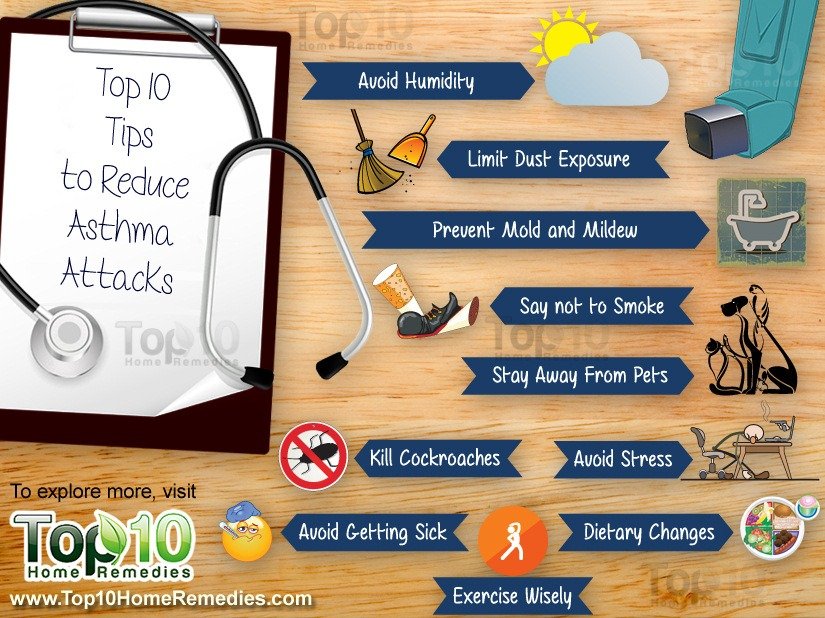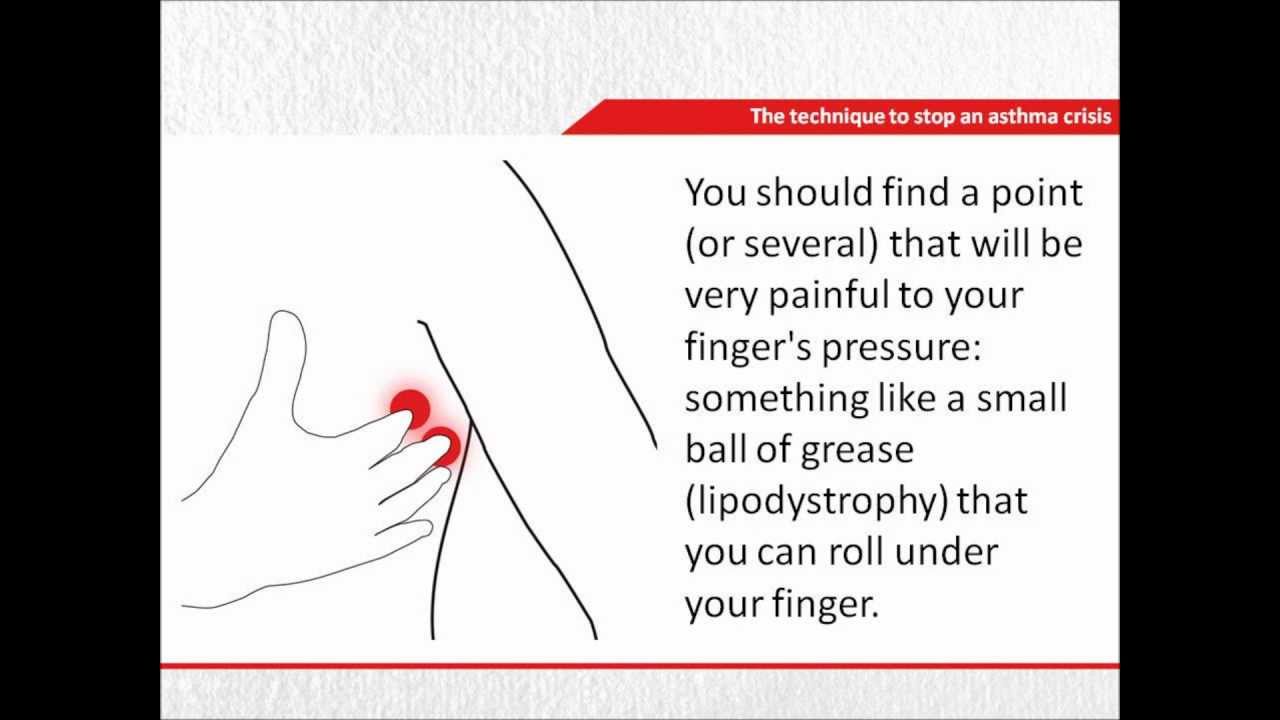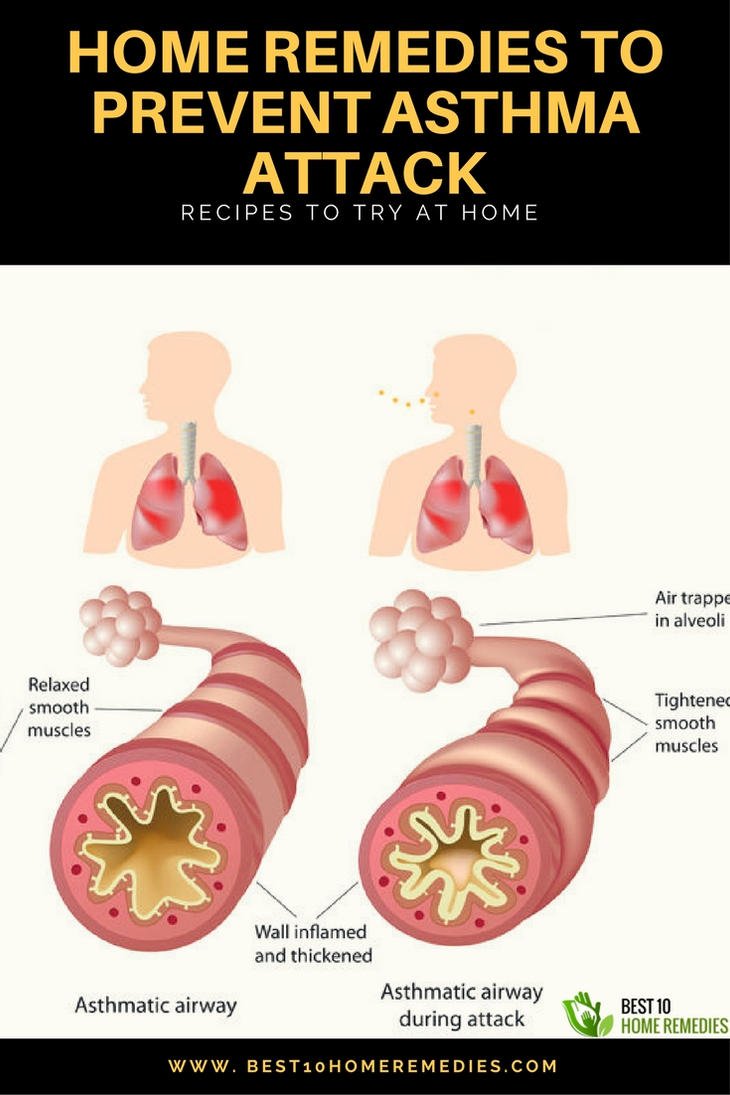What Happens During An Asthma Flare
During a flare-up, you might have:
- trouble breathing
- a whistling sound when you breathe
- a cough
Flare-ups happen when the airways in the lungs get more irritated and swollen than usual. Your lungs might make a sticky mucus, which clogs the airways. The muscles around the airways will also tighten up, making them really narrow. This clogging and narrowing make it tough to pull air in and push air out.
Some flare-ups are mild, but others are serious. If the flare-up is severe, a person might:
- struggle to breathe or have fast breathing even when sitting still
- not be able to speak more than a few words at a time without pausing
- have retractions while breathing in
Flare-ups can happen suddenly. They also can build up over time, especially if you haven’t been taking your asthma medicine.
Can Asthma Be Prevented
Asthma cant be prevented entirely, but there are some practical ways to reduce the risk of an asthma attack and live well with asthma.
- Get vaccinated for influenza: flu and other respiratory viruses are common triggers for asthma.
- Manage any allergies: asthma and allergies are closely linked, so treating allergic rhinitis and avoiding or managing any allergy triggers will help with your asthma.
- Live smoke-free: quit smoking if you smoke, and avoid any second-hand smoke .
- Eat well: a balanced diet helps you to maintain a healthy weight. Being overweight or obese makes asthma harder to manage.
- Care for yourself: mental health and asthma are linked, so let a trusted friend or your doctor know if you have been feeling sad or anxious, or dont enjoy things as much as before.
- See your doctor regularly: asthma needs to be regularly assessed and managed, and your medication needs may change over time. Ensure your asthma action plan is up to date by checking in with your doctor regularly.
Summary Prevention Of Asthma
Asthma is a dangerous disease which has long term effects but you can comfortably manage and live with it. It is important that you know the early and actual symptoms of asthma so that you are not caught unawares.
Note that all medications should be taken under strict prescription by your doctor. This is because there are some drugs like aspirin and ibuprofen which have side effects for asthmatics and can worsen your condition. This is also true in case of cough medicines as well as natural herbs.
Always contact your doctor in case you are not sure of any symptom and never assume that things will work themselves out. Learn basic first aid for asthma and never run out of prescribed drugs.
Recommended Reading: How To Get Rid Of Asthma Without Inhaler
Pay Attention To The Weather:
For many asthma patients, the weather conditions have serious affect on their disease. The weather is extremely too hot, too humid or poor air also can make asthma symptoms become seriously. In order to minimize the bad affect from the environment on your asthma, you need to limit your outdoor activities if the weather is not good for your disease.
Can Certain Foods Help With Asthma

Theres an increasing amount of evidence that suggests certain foods can help to control asthma. One example is ginger. Researchers found that ginger, when combined with commonly used inhaled medications, enhances airway dilation. It is believed that the ginger reduces the contraction of the muscles surrounding the airways.
A study showed that omega-3 fatty acids may help patients be less reliant on rescue medications, and improve quality of life. Its easy to get more foods high in these fats. Sources include walnuts , salmon, pumpkin seeds, and more.
Additionally, it may help your child to get more vitamin B6. It has been shown to help with breathing early in the morning and reduce acute wheezing episodes, and its especially beneficial for patients who are dependent on a steroid for their asthma.
It may also help your child to increase their intake of vitamin C. Studies showed that this reduced episodes of wheezing in children.
You may want to talk to a professional before incorporating new foods into your childs diet.
Also Check: Small Airway Disease
What Are The Triggers
There are many different triggers for asthma attacks. Many asthmatics are well aware of their trigger points. However, they may not always be able to avoid them.
Pollen and pollution are increasingly responsible for triggering asthma. Many people find a worsening of their symptoms in Spring, combined with the onset of hay fever. There are many species of grasses, trees and weeds in the UK. Some people are particularly sensitive to some and do not react at all to others. There is also huge variation around the country as to when pollen is released. People can begin to suffer from hay fever as early as January. About 20% of people with hay fever are allergic to birch tree pollen and this, as well as oak and plane trees, are responsible for many unpleasant symptoms and can exacerbate asthma.
Grass pollens are the most common cause of hay fever and usually affect people in May, June and July.
Weed pollens usually release pollen from early spring to early autumn.
If you know pollen is a trigger for your asthma, speak to your GP or asthma nurse.
The Met Office issues really useful pollen advice.
- Shortness of breath
- Tightness in the chest
- Often people find it particularly difficult to breathe out and have an increase in sticky mucus and phlegm
Its important to note that not everyone will get all of these symptoms.
How To Deal With Nighttime Asthma
Along with the prescribed asthma medicines, there are several steps that can help you in dealing with nighttime asthma attacks.
Clean your bedroom on a regular basis
It is important to use a vacuum cleaner with a high-efficiency particulate air filter that traps mites and their waste.
In this way, you can easily get the mites out of your bedroom.
In case, the vacuum you use does not have a HEPA filter then get the new one.
Eucalyptus oil
One of the best ways of dealing with nighttime asthma is through eucalyptus oil.
You just need to add a few drops of this oil in a hot water bowl and then simply take steam.
Doing so will help in opening all your nasal blockages in order to make it easy for you to breathe.
Go for a dust-proof mattress and pillow protectors
The dust-proof mattress and pillow protectors are woven tightly especially to keep dust mites away from the bedding.
Depending upon your bed size and pillow, you can easily find dust-proof mattresses and pillow protectors.
Belly breathing technique
You need to concentrate on your breathing carefully. Through your nose, start breathing slowly.
This technique of belly breathing will help in maximizing the air distribution inside the lungs.
You can simply lie down or even sit straight.
When you start inhaling, your abdomen needs to go out as opposed to your chest.
With your abdomen pushing inward, start exhaling slowly.
Dont sleep with pets
Ensure your pets dander does not collect or stick to the bedding and carpeting.
You May Like: How To Calm Down Asthma Symptoms
Consider Using An Air Filtration System
Photo courtesy of Alvaro Bernal via Unsplash
If allergens are one of the reasons for your asthma attacks, then you can clean up the air around you with a high-efficiency air filter.
Having equipment with air filtration systems can help get rid of the pollutants in your home so you could breathe cleaner air. However, not all devices can remove small allergen particles.
It is best to combine the use of air filters with other methods that can help control your asthma triggers and symptoms.
For some, asthmas may be a simple set of symptoms. But if not managed well, it may lead to worsening or even fatal conditions. If youre experiencing any recurring symptoms of asthma, book an appointment with the pulmonologists at MaayoWell.
A Quick Guide On How To Identify And Prevent Asthma Attacks
- Maayo Well
It could be more than just wheezing and coughing.
Sometimes, you encounter symptoms like the two and think that you have a common cough or allergies, but that may not be the case. It might be asthma and you wont even know it.
Keeping your respiratory health in check is important especially during this time of the COVID-19 pandemic. It helps your body absorb oxygen to promote regular blood circulation and it keeps your other organs functioning properly. In keeping your respiratory conditions healthy, you can:
- Eat a healthy diet
- Avoid pollutants that may damage your airways
- Exercise regularly
- Consult with your doctor regularly
Asthma is a common respiratory condition that requires immediate and frequent medical attention. Here are some things you need to know about it.
Also Check: Does Smoking Weed Affect Your Asthma
What Medications Can Help With Asthma
Asthma attacks, airway inflammation, and other issues can be controlled or prevented in many cases. Certain medications can be taken every day, like inhaled corticosteroids and leukotriene modifiers. These can help a child live more easily with their asthma and live a more active life. Of course, rescue inhalers will help too, and can be vital for a child.
When Should I Go To The Er
Don’t be embarrassed to get medical help if you think you need it. These situations call for emergency care:
- You take your asthma medicine and your flare-up doesn’t get any better.
- You feel a little better after taking your medicine, but your symptoms come back quickly.
- You have frequent wheezing, a lasting cough, or chest pain.
- Your lips and fingernails are bluish or grayish.
- You have trouble breathing, talking, or walking.
Also Check: Small Airways Disease Definition
Know When To Get Help
Symptoms that place you in the “red zone” of your asthma action plan are serious. If you experience any of these, follow the instructions in your plan and get emergency care right away:
- Wheezing when you inhale and exhale
- Nonstop coughing
Immediately call 911 or your local emergency number if:
- You can’t talk in full sentences.
- Your lips or fingernails turn blue .
- You begin breathing rapidly .
- You aren’t able to breathe in or out fully.
- You feel confused or agitated.
- Your rescue inhaler doesn’t relieve your symptoms.
How To Handle An Asthma Attack With No Inhaler

Individuals who are chronic asthmatics often carry an inhaler along with them, in order to manage emergency situations which may be associated with sudden attacks. However an individual may occasionally forget to carry the required inhaler and may suffer from an asthma attack. What should the person do in a situation like this here are a few steps that can be beneficial in handling an asthma attack without an inhaler,
Also Check: Can You Join The Army If You Have Asthma
What To Do If You Have An Asthma Attack
If you think you’re having an asthma attack, you should:
Never be frightened of calling for help in an emergency.
Try to take the details of your medicines with you to hospital if possible.
If your symptoms improve and you do not need to call 999, get an urgent same-day appointment to see a GP or asthma nurse.
This advice is not for people on SMART or MART treatment. If this applies to you, ask a GP or asthma nurse what to do if you have an asthma attack.
Effective Ways To Treat Asthma At Home
In people with asthma, the airways become narrow and produce a lot of mucus. It triggers difficulty in breathing, wheezing, coughing, and shortness of breath. Several factors can increase the risk of suffering from asthma. Some of the risk factors include having a blood relative with asthma, smoking, being overweight, and passive smoking. For some people, asthma doesnt pose many problems. However, there are others who suffer from asthma attacks.
Are you tired of having to latch on to your inhaler and your asthma medications? Do not let them go just yet. Make a few changes to your lifestyle see your symptoms ease up a lot.
10 Home Remedies for Asthma are:
Recommended Reading: Asthma Chromosome
Advice For Friends And Family
It’s important that your friends and family know how to help in an emergency.
It can be useful to make copies of your personal asthma action plan and share it with others who may need to know what to do when you have an attack.
You can photocopy your existing plan, or you could download a blank personal asthma action plan from Asthma UK and fill it in for anyone who might need a copy.
Or you could take a photo of your action plan on your phone, so you can show or send it to others easily.
Page last reviewed: 19 April 2021 Next review due: 19 April 2024
What If You Have An Asthma Attack And No Inhaler
is a condition where the airways in the lungs become constricted and produce more mucus than usual, making it difficult to breathe.
The American College of Allergy, Asthma & Immunology list the most common signs of asthma as:
- Coughing
- Wheezing
A life-threatening condition
Depending on the severity of the attack, asthma can be life-threatening. Fortunately, for the last fifty years or so asthma pumps which deliver medication directly to the lungs have been available. Inhalers are the asthmatics mobile medical kit and are real lifesavers, especially when there are no medical facilities nearby, and most asthma sufferers realise the importance of always having their inhaler at hand.
According to the contents of inhalers can be divided into relievers , preventers and long-acting bronchodilators. Steroids are anti-inflammatory drugs that effectively reduce the inflammation associated with asthma.
Inevitably, however, there will be situations where asthma suffers find themselves without an inhaler or one that, for whatever reason, doesnt work.
How to handle the situation
If the situation seems dire and the person is struggling to breathe, take them to the nearest ER or call an ambulance. Health Central emphasises that ER doctors would rather that patients come in with relatively mild symptoms than arrive at a later stage gasping for breath. It is much easier to treat mild symptoms than handle a crisis situation.
Read more:
Read Also: Elevated Ige Asthma
How To Help In An Asthma Attack
If someone is having an asthma attack, always follow the instructions outlined on their medication. However, if they do not have them to hand, these are the steps to follow. These guidelines are suitable for both children and adults.
Be calm and reassuring as reducing the stress and keeping the casualty calm really helps them to control their symptoms. Panic can increase the severity of an attack. Take one to two puffs of the reliever inhaler , immediately using a spacer device if available.
- Stay as calm as you can and encourage them to stay calm too
- Sit them down, loosen any tight clothing and encourage them to take slow, steady breaths.
- If they do not start to feel better, they should take more puffs of their reliever inhaler
- If they do not start to feel better after taking their inhaler as above, or if you are worried at any time, call 999/112.
- They should keep taking the reliever inhaler whilst waiting for the paramedics to arrive
- If the person has been prescribed an adrenaline auto-injector and you suspect the asthma attack may be due to an allergic reaction and the reliever inhaler is not working administer the AAI. Five this injection into the upper, outer part of their thigh according to the instructions. If worried in any way, check with the emergency services and keep them informed and updated as to the casualtys condition.
DO NOT take them outside for fresh air if it is cold as cold air makes symptoms worse.
Asthma What It Is And How To Help If Someone Is Having An Asthma Attack
by Emma Hammett | Aug 27, 2021 | Essential First Aid, First Aid Advice |
We all know people who have asthma. However, very few of us would know what to do if someone close by started to have a serious asthma attack and was struggling to breathe. Read on to find out what asthma is, what may trigger it and how to help someone having an asthma attack.
Don’t Miss: Homemade Inhaler
What Is Asthma And What Are The Symptoms
Asthma is a chronic respiratory disease that affects the airways. It can cause wheezing, shortness of breath, chest tightness, and coughing.
It also has symptoms that are not related to breathing they include fatigue, an increased heart rate , and fever.
Asthma is typically treated with asthma medications and by avoiding the things that cause an attack. However, when those methods are not enough, it may be necessary to get emergency medical treatment.
When To Go To The Er For Asthma

If you or someone you know are experiencing a severe asthma attack, seek medical attention immediately. Ideally, you should have already talked with your doctor to develop an asthma action plan in the case of an emergency. Otherwise, here are some common signs that indicate you should seek medical help:
- Minimal/no improvement with quick-relief inhaler use
- Abnormal shortness of breath during minimal physical exertion
- Rapid decline in breathing or wheezing
- Blue lips or fingernails
You May Like: How Often Can You Use A Nebulizer For Asthma
Care Advice For Asthma Attack
